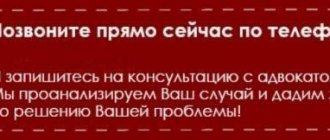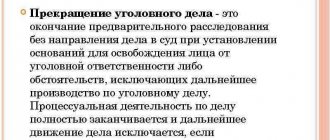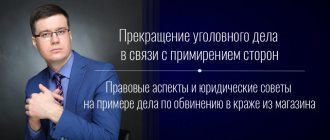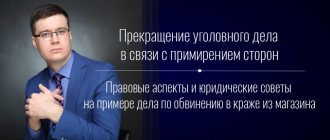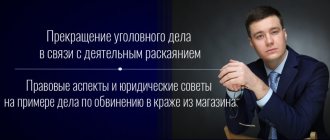Have you been given a choice - to take a special procedure for considering a criminal case or to consider the case in general? Let's figure out which is better.
A special procedure is used in order to simplify the procedure for considering a criminal case by the court and reduce the expenditure of time and effort.
A special procedure is possible only if the defendant admits his guilt and agrees with the charge brought against him!
Moreover, consideration of the case in a special manner is possible only in cases of crimes for which the maximum sentence does not exceed 10 years of imprisonment.
But before you agree to a special order, you need to weigh all the pros and cons.
Disadvantages of a special procedure for considering a criminal case
What are the disadvantages in particular order? The most important disadvantage of the special order is that the court does not establish the circumstances of the crime. The judge does not conduct research and evaluation of evidence collected in a criminal case. In this case, circumstances characterizing the personality of the defendant, and circumstances mitigating and aggravating the punishment can be examined. A special hearing is usually held once, no witnesses are called to the court, no evidence is disclosed, the case is considered within an hour or two, and such consideration is formal in nature.
For the defendant, this is rather a minus, because if an unscrupulous investigator did not collect the necessary evidence of guilt, but received the consent of the defendant to conduct the case in a special manner, the verdict will be 100 percent guilty and unfair!
As a rule, all investigators offer a special procedure to the accused in order to reduce their workload, not have to collect evidence, and avoid complaints and petitions from the defense and the accused himself. Cases sent to court under a special procedure usually contain many errors and do not have adequate evidence of the defendant’s guilt. In such cases, everything is based, as a rule, only on the admission of guilt.
Therefore, if you think that your actions are classified incorrectly, or you are charged with something that you did not do, do not agree to a special procedure, such a case should be considered in a general manner with the possibility of examining all the evidence of the prosecution and defense!
Grounds for holding a preliminary hearing in criminal proceedings
The circumstances under which the considered stage of the proceedings is permitted include:
- Receipt of a request from one of the parties to exclude evidence.
- Detection of circumstances under which the return of materials to the prosecutor is permitted.
- Discovery of facts, the presence of which may result in termination or suspension of the proceedings.
- Receipt of a petition from the accused to schedule a hearing with the participation of a jury.
An application serving as the basis for a preliminary hearing in criminal proceedings may be filed after the defendant has familiarized himself with the materials or within three days after the prosecutor has sent them to the court and served the indictment (conclusion) on the subject.
Jury participation
A preliminary hearing in criminal proceedings if there is a request to involve assessors is based on general rules. However, given the specifics of such proceedings, the legislation establishes a number of reservations:
- A crime for which several subjects are held accountable is considered against all of them if at least one of them has submitted a request for a jury.
- If the relevant request was not sent or was not confirmed during the meeting, the proceedings are carried out in another court. It is determined according to the rules of Art. 30 Code of Criminal Procedure.
- The resolution that sets up a preliminary hearing in a criminal case, in addition to resolving other issues, determines the number of candidate jurors to be called, which must be at least 20.
The decision to schedule a jury trial is final. Subsequently, the defendant’s refusal to consider the case in such a composition will not be accepted. At the request of the parties, they are given copies of the resolution.
Explanations of the RF Armed Forces
In the Resolution of October 31, 1995, the Plenum indicated that, firstly, the court’s request must be made in writing. Secondly, the document must provide the exact name, date of adoption, number, source of publication and other data about the legislative act to be verified. In addition, the court in its request indicates the reasons for which the decision to send the application was made. Also in this Resolution, the Supreme Court recommended that the authorities simultaneously change the measure of restraint for the accused if he was in custody at that moment. This is a fairly important note, since consideration of requests by the Constitutional Court takes a significant period of time.
Uncertainty of the Code of Criminal Procedure
The Code does not establish a clear definition of violations that may be committed when drawing up a conclusion or an act of accusation. The Code of Criminal Procedure does not provide for criteria by which one can judge whether the court has the opportunity to make a decision or does not have it. In this regard, quite often in practice there are disputes about the legality of decisions made on the return/non-return of materials to prosecutors. Explanations were given at the time by the Constitutional Court and the Supreme Court. The first, in particular, in the Resolution of December 8, 2003, noted that the provisions of Art. 237, part 1 of the Code of Criminal Procedure does not exclude the power of courts on their own initiative or in accordance with a party’s request to return materials to the prosecutor if, during pre-trial proceedings, there were significant violations of the law that cannot be eliminated during the proceedings, if such a decision is not related to the completion of the preliminary investigation or inquiry. More specific explanations were given by the Plenum of the Supreme Court in the Resolution of March 5, 2004. In particular, the Supreme Court indicated that non-compliance with the provisions of Art. 220, 225 of the Code of Criminal Procedure, excluding the possibility of making a decision on the merits in accordance with the document. The latter, in particular, occurs when:
- The absence in the document of indications of the subject’s previous criminal records, data on his whereabouts, information about the victim (if identified), etc.
- Inconsistency between the charges set out in the conclusion/act and those present in the decision to charge the person as an accused.
- Absence of the signature of the inquiry officer/investigator, the stamp of approval of the prosecutor.
Taking into account the above, we can conclude that a preliminary hearing in criminal proceedings is appointed if there are violations in the drawn up indictment/conclusion, if:
- They are significant.
- Prevent the court from making a decision.
- Eliminating their consequences is not associated with making the investigation or inquiry complete.
- A copy of the report/conclusion was not served on the accused.
- Elimination of consequences does not require time expenditure exceeding 5 days.
The purpose of returning materials to the prosecutor if a copy of the report was not served on the accused is quite clear. The official is obliged to ensure the execution of the investigative action, which serves as one of the key procedural means that guarantees the subject’s exercise of his right to defense. However, the court itself cannot correct this violation. This is due to the presence of a general requirement that the authority does not have the right to take any actions that cast doubt on his involvement with the prosecution.
Legal requirements
When returning materials to the prosecutor, a number of provisions must be taken into account. They must be observed regardless of what circumstances served as the reason for returning the case to the prosecutor. The legislation requires the following:
- The question of choosing a preventive measure for the accused, the materials on the crime of which are returned to the prosecutor, is decided by the judge.
- Evidence obtained to correct violations that were committed during the preparation of the indictment/conclusion, if it took more than 5 days, is a priori considered unacceptable.
Suspension or termination of production
The procedure for a preliminary hearing in a criminal trial in this case is prescribed in the presence of circumstances similar to those that guide the inquiry officers/investigators during the investigation. However, there are two significant differences. In the list of circumstances that a judge may be guided by when scheduling a preliminary hearing in criminal proceedings, there is no provision specified in Art. 208 part 1 clause 1 of the Code of Criminal Procedure – “failure to identify the subject who is subject to prosecution as an accused.” This is quite justified, since the authorities cannot receive materials for which the perpetrator has not been identified. At the same time, the list of grounds is supplemented by a condition under which the court can suspend proceedings if a request is sent to the Constitutional Court regarding the constitutionality of the law to be applied when considering the materials. Another circumstance is the acceptance of a complaint from any party to the proceedings. In it, the participant in the process must indicate a violation of his constitutional rights as a result of the application or possible application of a norm that is not consistent with the Basic Law of the Russian Federation.
Other circumstances of the return of materials to the prosecutor
If there is a need to draw up an indictment/conclusion when a decision is made to apply compulsory medical measures, a preliminary hearing in criminal proceedings is also scheduled. This circumstance is revealed when the question of placing the accused under medical supervision is raised. After reviewing the materials, the court may not agree with the decision to apply compulsory medical measures. In this regard, he may admit that the proceedings should be carried out according to the general rules - with the investigation carried out in full and the indictment/conclusion drawn up based on its results. A preliminary hearing in criminal proceedings is also appointed when:
- Identifying circumstances that make it possible to combine production into one.
- Lack of clarification of the rights provided for the accused under Art. 217, part 5 of the Code of Criminal Procedure, when familiarizing him with the materials.
- The need to take investigative measures against a subject hiding from court.
Additional rules
During the preparation or preliminary hearing, the defense may file a motion to call a witness to corroborate the defendant's alibi. This application must be granted by the court in any case. In addition, the defense may submit a motion to request additional items or evidence. If the court finds that they are essential to the proceedings, the request must be granted. Witnesses can be any subjects who know anything about the circumstances of the implementation of investigative actions, the seizure or inclusion of documents in the materials considered at the meeting.
Exceptions
During the preliminary hearing, the court cannot decide to dismiss the case if circumstances have been identified that indicate the existence of rehabilitative grounds for closing the proceedings or ending the prosecution. In this case, production is carried out according to general rules. If the discovered exonerating circumstances are confirmed, the court issues an acquittal. During the preliminary hearing, additional grounds may be identified that oblige a decision to terminate the proceedings. This is the prosecutor's refusal to bring charges. In this case, the rules specified in Art. 246 part 7 of the Code of Criminal Procedure.

